

Information, Knowledge, Epistemology, Language. Death - Grief, Loss, Death & Dying. Review - Deathby Shelly KaganYale University Press, 2012Review by Brad Frazier, Ph.D.Jun 25th 2013 (Volume 17, Issue 26)
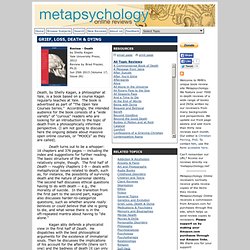
What's this thing called Love? And what does it have to do with Ethics? What’s this thing called love?

And what does it have to do with Ethics? Wanderley Dias da Silva December 15, 2013 My answer to the second question is simply. Walter Benjamin and Critical Theory. Walter Benjamin is one of the most influential critical theorists of the early twentieth century.
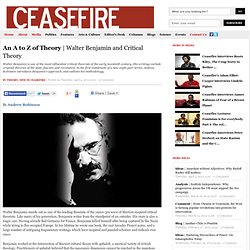
His writings include original theories of the state, fascism and revolution. In the first instalment of a new eight-part series, Andrew Robinson introduces Benjamin's approach, and outlines his methodology. By Andrew Robinson. What Do Most Philosophers Believe? A Wide-Ranging Survey Project Gives Us Some Idea. What do most philosophers believe?
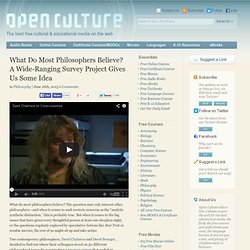
The question may only interest other philosophers—and when it comes to such esoteric concerns as the “analytic synthetic distinction,” this is probably true. But when it comes to the big issues that have given every thoughtful person at least one sleepless night, or the questions regularly explored by speculative fictions like Star Trek or zombie movies, the rest of us might sit up and take notice. Irony, Postmodernism, and Our Current Age. The Non-Philosopher's Guide to Can Bad Men Make Good Brains do Bad Things? Heterotopia (space) Heterotopia is a concept in human geography elaborated by philosopher Michel Foucault to describe places and spaces that function in non-hegemonic conditions.
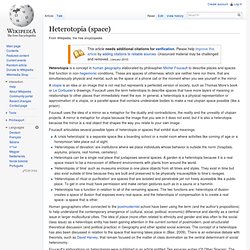
These are spaces of otherness, which are neither here nor there, that are simultaneously physical and mental, such as the space of a phone call or the moment when you see yourself in the mirror. A utopia is an idea or an image that is not real but represents a perfected version of society, such as Thomas More’s book or Le Corbusier’s drawings. Foucault uses the term heterotopia to describe spaces that have more layers of meaning or relationships to other places than immediately meet the eye.
Getting to Philosophy. Clicking on the first link in the main text of a Wikipedia article, and then repeating the process for subsequent articles, usually eventually gets you to the Philosophy article.
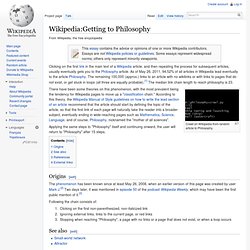
As of May 26, 2011, 94.52% of all articles in Wikipedia lead eventually to the article Philosophy. The remaining 100,000 (approx.) links to an article with no wikilinks or with links to pages that do not exist, or get stuck in loops (all three are equally probable).[1] The median link chain length to reach philosophy is 23. Crawl on Wikipedia from random article to Philosophy. User:Ilmari Karonen/First link. An internet meme, originally discovered by a user of Reddit.com named pixelcrak [1] on April 13, 2011 and further popularized by xkcd [2], says that if you go to a random article on Wikipedia and keep clicking the first non-parenthesized link in the body text of each article you get, you'll always eventually end up at Philosophy.

But is this really true? Or, rather, what is the probability of that actually happening? To test this, I downloaded the English Wikipedia database dump from 26 May 2011 and wrote a Perl script to extract the first link from each page, skipping any templates, comments, image captions, categories, interlanguage links, selflinks, hatnotes and links inside parentheses. (At least, I thought I skipped image captions... I'm not sure why my script still thinks United States Census links to United States Census Bureau.
All Roads Lead to “Philosophy” All Roads Lead to “Philosophy” There was an idea floating around that continuously following the first link of any Wikipedia article will eventually lead to “Philosophy.” 1 This sounded like a reasonable assertion, one that makes a certain amount of sense in retrospect: any description of something will typically use more general terms.
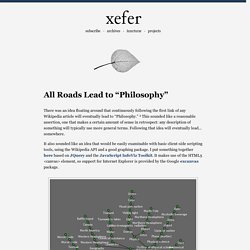
Following that idea will eventually lead… somewhere. It also sounded like an idea that would be easily examinable with basic client-side scripting tools, using the Wikipedia API and a good graphing package. I put something together here based on JQuery and the JavaScript InfoViz Toolkit. It makes use of the HTML5 <canvas> element, so support for Internet Explorer is provided by the Google excanvas package. Wikipedia Radial Graph. The 50 most interesting articles on Wikipedia « Copybot. Deep in the bowels of the internet, I came across an exhaustive list of interesting Wikipedia articles by Ray Cadaster.

It’s brilliant reading when you’re bored, so I got his permission to post the top 50 here. Bookmark it, start reading, and become that person who’s always full of fascinating stuff you never knew about. The top 50 Wikipedia articles by interestingness. The Able Slave. Suppose there are ten people on a desert island.
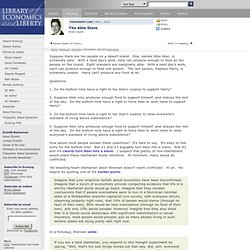
One, named Able Abel, is extremely able. With a hard day's work, Able can produce enough to feed all ten people on the island. Eight islanders are marginally able. With a hard day's work, each can produce enough to feed one person. The last person, Hapless Harry, is extremely unable. Questions: Justice. Truth/Education.
The Big Questions. The Big Philosophical Questions. The Cabinet of Invisible Counselors. Have you ever had a discussion with someone who posed this question: “If you could invite any five people, living or dead, to dinner, who would they be?” The Political Compass. Morality Quiz/Test your Morals, Values & Ethics - Your Morals.Org. Laws of Physics Can't Trump the Bonds of Love. Zack ConkleLIFE LESSONS Jeffrey Wright with his son, Adam, who has a developmental disorder, in a scene from “Wright’s Law.” Jeffrey Wright is well known around his high school in Louisville, Ky., for his antics as a physics teacher, which include exploding pumpkins, hovercraft and a scary experiment that involves a bed of nails, a cinder block and a sledgehammer.
But it is a simple lecture — one without props or fireballs — that leaves the greatest impression on his students each year. The talk is about Mr. Wright’s son and the meaning of life, love and family. It has become an annual event at Louisville Male Traditional High School (now coed, despite its name), and it has been captured in a short documentary, “Wright’s Law,” which recently won a gold medal in multimedia in the national College Photographer of the Year competition, run by the University of Missouri.
The filmmaker, Zack Conkle, 22, a photojournalism graduate of Western Kentucky University and a former student of Mr. Mr. A magazine of ideas. Philosophy. Ontology Explorer. Trees of life. SEMANTICS. Russell's teapot. Russell's teapot, sometimes called the celestial teapot or cosmic teapot, is an analogy first coined by the philosopher Bertrand Russell (1872–1970) to illustrate that the philosophic burden of proof lies upon a person making scientifically unfalsifiable claims rather than shifting the burden of proof to others, specifically in the case of religion.
Russell wrote that if he claims that a teapot orbits the Sun somewhere in space between the Earth and Mars, it is nonsensical for him to expect others to believe him on the grounds that they cannot prove him wrong. Russell's teapot is still referred to in discussions concerning the existence of God. Origins of the analogy[edit] In an article titled "Is There a God? " Sokal affair.
The resultant academic and public quarrels concerned the scholarly merit of humanistic commentary about the physical sciences; the influence of postmodern philosophy on social disciplines in general; academic ethics, including whether Sokal was wrong to deceive the editors and readers of Social Text; and whether the journal had exercised appropriate intellectual rigor before publishing the pseudoscientific article. Background[edit] In an interview on the NPR program All Things Considered, Sokal said he was inspired to submit the hoax article after reading Higher Superstition (1994), by Paul R.
Personal and Historical Perspectives of Hans Bethe. Of Other Spaces (1967), Heterotopias. Levinas Reading Group: Links/Resources. PRIMARY SOURCES Collected Philosophical Papers | Trans. Slavoj Zizek - Enjoy Your Symptom-Jacques Lacan in Hollywood and Out. Lacan Dot Com. Kant at the Bar: Transcendental Idealism in Daily Life. Notes From an Employed Philosopher - The Conversation. In an interview with radio talk-show host Bill Bennett, Pat McCrory, North Carolina’s governor, criticized the “educated elite” for offering courses that supposedly don’t help graduates get jobs.
He specifically attacked areas of study like philosophy and gender studies, both of which are strong programs at the University of North Carolina at Chapel Hill. As a matter of fact, the Chapel Hill doctoral program in philosophy is ranked ninth in the country according to the annual Leiter report on programs in the field, joining Harvard, Yale, New York, and Stanford Universities in the top 10.
How to sell philosophy - bookforum.com / omnivore. Follow us. Must We Mean What We Say? Interview with Edward Wilson on the Formation of Morals. Edward O. Wilson doesn't come across as the kind of man who's looking to pick a fight. Video & Audio: Why isn't there more progress in philosophy? - Metadata. TPM Online: The Philosophers' Magazine.
Wireless Philosophy. Constructor Theory. Anthroposophy. John Lloyd inventories the invisible. Social Dark Matter: On Seeing and Being Seen. You probably remember a grade school teacher who seemed to have eyes at the back of her head. Are Savages Noble?